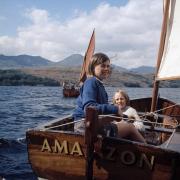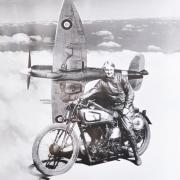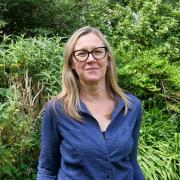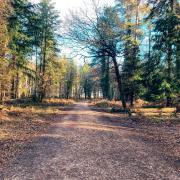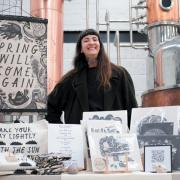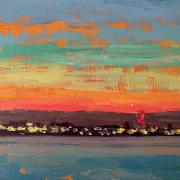Faith Eckersall meets two siblings attempting to row 3,000 miles unsupported across the Atlantic to highlight the deadly effects of skin cancer and raise £100,000 in memory of a very special man who lost his life to the disease
Keep your eyes out very soon for a strange sight on the Solent. Two brothers, rowing a boat, taking it in turns to hold up a parasol to keep the sun off. But there is a method – and a tragic tale – behind Greg Bailey and Jude Massey’s apparent madness.
They are training for a Herculean attempt to row the Atlantic without a support vessel in January as the Ocean Brothers, in memory of their step-father and father, Peter Massey, a keen sailor and windsurfer who died in August 2015 after a 16-year battle against skin cancer and facial disfiguration.
The parasol is an important part of the message because parasols (and broad-brimmed hats, sun-cream and protective clothing) reduce the effects of the sun’s UV, which is what caused their father’s devastating condition. “Peter ran a successful business in Lymington but during the 1970s, in his early twenties, he hitchhiked to India with his best friend, with little or no protection from the sun,” explains stepson Greg, 27, a doctor. “He wouldn’t have known the risks then but his fair skin increased his risk-factor as did his love of watersports.”
Just one episode of painful sunburn every two years trebles the risk of developing skin cancer, which now tops the league as Britain’s most common cancer. “It’s four times more common than the second most common, which is breast cancer, according to Public Health England, but people just don’t have awareness of this,” says Greg.
Jude, 18, lives on the Isle or Wight with his mother, Alexandra Massey, and was only 16 and had just finished his GCSE’s when he lost his father. He describes the basal cell carcinoma that appeared on his father’s face, which led to the eventual loss of his eye and part of his skull. “Cancer was a long, dreary journey for him and the saddest thing was that if he’d known how dangerous sunburn was he would have covered up and used the cream and probably still be here now, because he made such huge efforts to stay around for us,” says Jude. “I wouldn’t wish what happened to him on anyone.”
In the months after Peter’s death the family was plunged into shock, says Greg. They wanted to do something to commemorate his life, raise money for the British Skin Foundation which researches skin cancer and get vital sun safety messages across.
Most people would have done this by training for the Great South Run or getting sponsored to lie in a bath of baked beans, perhaps. But the brothers decided this wouldn’t reflect the enormity of their loss, or of the message, and so they hit on the idea of a 3,000-mile Atlantic row from Gran Canaria to Barbados.
“We’ve grown up with the sea; Peter was a keen windsurfer, and we felt that only an ocean could reflect an event of this size to attract enough sponsorship,” says Greg. They are hoping to raise £100,000, all of which will fund skin cancer research.
It’s easy to imagine at this stage that both are keen rowers. “Actually, we’ve never really rowed anything before,” says Greg, cheerfully. “When we first committed to it we weren’t fully informed of what was involved – twenty times more people have climbed Everest and more people have gone into space than successfully completed this crossing.”
Having spoken to some record-breaking rowers – including Olympic Gold Medalist Andrew Triggs-Hodge – and to Dr Spike Briggs, a former lecturer of Greg’s, who is an intensive care doctor and directs a medical offshore support firm, they are now fully aware of what rowing across the world’s second-biggest ocean entails.
Although it’s not all what you’d think: “Sea sickness is the most common difficulty,” says Greg. “You can become confused and dehydrated and your gut stops working properly.” They’ll also have to look out for sores on their hands, feet and bottoms from the continual action and burns from the gas-powered stove used to heat water and food. “In a confined space the water can come out of the jet-boil and burn your legs,” says Greg.
Then there’s bad weather, large ships (they have VHF radio to warn them of their presence), sea creatures who may or may not be friendly and, of course, the mental strain.
“We have a solar-panel which will power up my waterproof iPod so I plan on downloading hundreds of books, music and inspirational podcasts to listen to as we row and Jude will be the same, although I’m sure we’re going to have those crazy moments when we sing or even dance,” says Greg. Given that they will be rowing two hours on, two hours off, night and day for perhaps eight weeks, the discipline sounds horrendous.
They’ve had messages of support from explorer Sir Ranulph Fiennes, who described their effort as: ‘A tremendous voyage for a moving and deeply touching cause’, and from adventurer Bear Grylls.
“I don’t think we’ll be in need of constant distraction although it will be a whole new level of solitude at times,” says Greg. Jude agrees. “I’m looking forward to that part so that I can reconnect with dad,” he says. “He was a spiritual person and I feel that on the boat we’ll be with him some way.”
Their R20 boat is being designed by Rannoch Adventure and as they prepare to start training in earnest, they are toiling away in the gym. They’ll also be trying to pack on as much weight as possible because they will expend more calories than they are able to eat during the trip and will lose approximately two stone each as, says Greg; ‘We’ll slowly digest our own body!’
More important still will be ensuring they protect themselves from the sun. Maritime based firm Musto have sponsored their UV protective clothing; they will use high-factor sun cream from their sponsors, wear wide-brimmed, tie-on hats to keep the sun off their faces and take their beloved parasol.
“Parasols are the most old-fashioned way of keeping the sun off so we’ll be putting ours up as often as we can,” says Jude. “Parasols look a bit daft but they get the message across how serious it all is.”
At just 18, you wonder if he does realise how serious it is. “When Greg and I first talked about it I was pretty terrified,” he admits. “But by the time we’d researched it I’d become more confident that with the right preparation and all the planning and training, plus the encouragement from those who are supporting us, that we can do it.”
Although the trip is unsupported – meaning no nearby boat to help them if they capsize or are pranged by a stray floating container – they will have an automated text message system with the current GPS co-ordinates sent via satellite phone to a live tracking map on their homepage. “Our base team will give us weather updates and routing advice via the sat phone”, says Jude who says updates and images will also be on their Facebook page.
The keenest follower will be Jude’s mum, Alexandra, who has given the trip her blessing. “I can’t imagine how much she’ll worry,” says Jude, who says that she and their pet dog, Lola, are the things he’ll miss most.
“But I know we can do this; we have to because it is such an important message that we want to get across.”
More…
• Writer Matthew ‘M.J.’ Arlidge on why Hampshire is a perfect fit for Detective Inspector Helen Grace - The detective writer who chose Southampton as the setting for his dark novels tells Faith Eckersall why the city - and the New Forest beyond - are a perfect fit with his ‘fractured’ heroine, Detective Inspector Helen Grace




